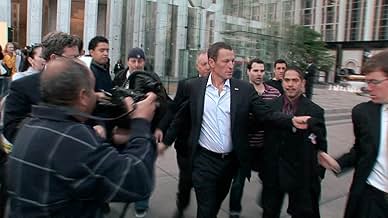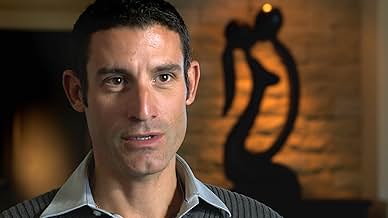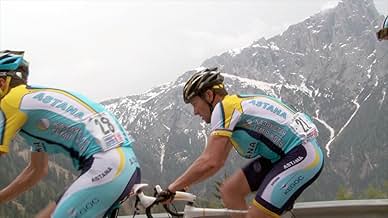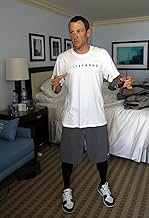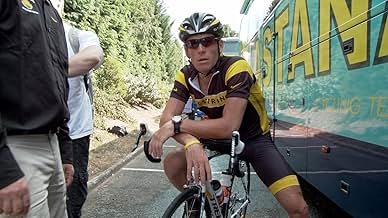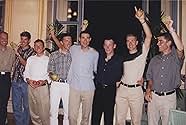CALIFICACIÓN DE IMDb
7.2/10
8.2 k
TU CALIFICACIÓN
Agrega una trama en tu idiomaA documentary chronicling sports legend Lance Armstrong's improbable rise and ultimate fall from grace.A documentary chronicling sports legend Lance Armstrong's improbable rise and ultimate fall from grace.A documentary chronicling sports legend Lance Armstrong's improbable rise and ultimate fall from grace.
- Dirección
- Guionista
- Elenco
- Nominada a1 premio BAFTA
- 2 premios ganados y 8 nominaciones en total
Michael Bloomberg
- Self - NYC Mayor
- (material de archivo)
Bill Clinton Jr.
- Self - Former US President
- (material de archivo)
Anderson Cooper
- Self - Interviewer
- (material de archivo)
Sheryl Crow
- Self - Lance's Girlfriend
- (material de archivo)
Tyler Hamilton
- Self - Teammate
- (material de archivo)
- Dirección
- Guionista
- Todo el elenco y el equipo
- Producción, taquilla y más en IMDbPro
Opiniones destacadas
I always admire the commitment of a documentarian. It feels destined for Alex Gibney to have been following Lance Armstrong just before the turn of his downfall as all his documentaries need a tinge of controversy before they're just right. A comeback film wouldn't have been as interesting as this. Perhaps it's morbid curiosity of why I'm looking into Lance Armstrong more now that the truth has broken out than when he was heroic cyclist who wasn't held back by a little cancer. What brings a man to do something like this? What was the point? The Armstrong Lie has intimate access to the disgraced icon and it's undeniable that he's compelling to watch, if sometimes repulsive. Above all, it reveals the nature of our celebrity worship culture and the power it feeds and the lives it destroys.
The documentary covers all aspects of the sport of cycling. It's quite infectious with its cinematic style and I regret watching this the day that the Tour de France was close to me but I missed it. The film gives scattered information about the basics but there's great insight into how the cheating works. The cutting makes the human drama thrilling as people try to beat Armstrong at his game. The film doesn't necessarily take a side, but he still makes you sick to your stomach when he lies through his teeth to the camera. I couldn't help but keep thinking that Ben Foster will be perfect for Stephen Frears' upcoming film. We still haven't got all the facts, especially about Armstrong's peers, and there's quite a bit about media manipulation here too which the film is a part of, but the story of a contemporary legend falling touches an aching nerve.
8/10
The documentary covers all aspects of the sport of cycling. It's quite infectious with its cinematic style and I regret watching this the day that the Tour de France was close to me but I missed it. The film gives scattered information about the basics but there's great insight into how the cheating works. The cutting makes the human drama thrilling as people try to beat Armstrong at his game. The film doesn't necessarily take a side, but he still makes you sick to your stomach when he lies through his teeth to the camera. I couldn't help but keep thinking that Ben Foster will be perfect for Stephen Frears' upcoming film. We still haven't got all the facts, especially about Armstrong's peers, and there's quite a bit about media manipulation here too which the film is a part of, but the story of a contemporary legend falling touches an aching nerve.
8/10
To judge something in terms of how it's executed is all well and good but in a documentary such as this the message takes precedence. It seeks the truth and all the arguments aren't displayed for that to emerge. If it it simply allowed the viewer to make up his own mind then that would be o.k but the film displays a bias thereby becoming a vehicle and a misleading one at that.
The fact that doping was prevalent in cycling and still plays a large factor is obvious. If Armstrong was racing on a level playing field of dopers then that to me would also have been acceptable. However this was far from the case.
Non of Lance's team mates were caught doping whilst they were in his team. Meanwhile all his major competitors were absent from the start line at various points in time due to suspensions and had some key teammates missing from every tour for the same reason. Throughout all the disruptions, devastation, controversy and even a suicide Armstrong was always there with a full strength squad.
The film touches on the importance of team mates and how on all of his wins Armstrong rode alone for only minutes at a time, but fails to take the next step and look at how the various disqualifications imposed on all other teams (apart from his own during his winning years) affected his competitors. Had the film done this Armstrong would never have agreed to be in it because he's still pushing the lie that he won those seven Tours fair and square once we accept as fact that they were all doping.
The UCI had invested in him and were being invested in by a lot of the same sponsors, they allowed many cyclists to burn whilst protecting this man. The film doesn't touch on those aspects and the film maker remains a fan.
I gave the film five stars because it is well shot and well put together. I am a cycling fan and it's view of the race was a pleasure to watch. There is stock footage obviously but the film does follow Armstrong and films the 2009 race independently. The film gives an insight into what it takes to be a professional rider and rider's relationships with one another and their team officials.
Some of the people interviewed I've never seen interviewed i.e doctor Ferrari, which added another point of interest for me.
The 2009 and other pre-'outed' interviews were interesting, giving an insight into Armstrong's mentality at the time and although there is marked contrast to his post-confessional ones it's by no means a transformation and a true repentance. His approach to people seems outwardly very different now, but his attitude towards his legacy and the morality of his actions remain to all intents and purposes unchanged. The exclusions of Paul Kimmage and Greg Lemond from the documentary also indicate this.
I'd say watch the film but bear the other stuff in mind too.
The fact that doping was prevalent in cycling and still plays a large factor is obvious. If Armstrong was racing on a level playing field of dopers then that to me would also have been acceptable. However this was far from the case.
Non of Lance's team mates were caught doping whilst they were in his team. Meanwhile all his major competitors were absent from the start line at various points in time due to suspensions and had some key teammates missing from every tour for the same reason. Throughout all the disruptions, devastation, controversy and even a suicide Armstrong was always there with a full strength squad.
The film touches on the importance of team mates and how on all of his wins Armstrong rode alone for only minutes at a time, but fails to take the next step and look at how the various disqualifications imposed on all other teams (apart from his own during his winning years) affected his competitors. Had the film done this Armstrong would never have agreed to be in it because he's still pushing the lie that he won those seven Tours fair and square once we accept as fact that they were all doping.
The UCI had invested in him and were being invested in by a lot of the same sponsors, they allowed many cyclists to burn whilst protecting this man. The film doesn't touch on those aspects and the film maker remains a fan.
I gave the film five stars because it is well shot and well put together. I am a cycling fan and it's view of the race was a pleasure to watch. There is stock footage obviously but the film does follow Armstrong and films the 2009 race independently. The film gives an insight into what it takes to be a professional rider and rider's relationships with one another and their team officials.
Some of the people interviewed I've never seen interviewed i.e doctor Ferrari, which added another point of interest for me.
The 2009 and other pre-'outed' interviews were interesting, giving an insight into Armstrong's mentality at the time and although there is marked contrast to his post-confessional ones it's by no means a transformation and a true repentance. His approach to people seems outwardly very different now, but his attitude towards his legacy and the morality of his actions remain to all intents and purposes unchanged. The exclusions of Paul Kimmage and Greg Lemond from the documentary also indicate this.
I'd say watch the film but bear the other stuff in mind too.
THE ARMSTRONG LIE is a fascinating documentary. Shot over a period of four years, it purports to investigate the oft-repeated claim that cyclist Lance Armstrong was a cheat, and that every single one of his Tour de France wins were achieved by taking drugs. Alex Gibney's narrative begins as a defense of Armstrong's behavior, but as different elements of the truth emerge, so the filmmaker has to keep readjusting his position. Gibney is obviously a fan of Armstrong (as many people still are), but as the seamy details of what the cyclist did in order to win his races gradually emerge, so the filmmaker gradually understands how wrong-headed he has been give his unquestioning support. Armstrong emerges as a thoroughly unsavory character, pathologically unwilling to acknowledge the truth about himself, and always looking to manipulate the media so that he emerges in a positive light. Even his so-called 'confessional' interview with Oprah looks like a deliberate attempt to rescue his reputation. As the narrative unfolds, so Gibney gradually comes to understand the truth about his subject, and realizes to his cost that much of the film has unwittingly helped to obfuscate that truth, portraying Armstrong instead as a man more sinned against than sinning. It is only right at the end that Gibney admits the truth of Armstrong's motives, and how Armstrong himself has deliberately duped the filmmaker. As a result THE ARMSTRONG LIE is a film that is more about media manipulation than anything else, revealing just how persuasive - and dangerous - a person Armstrong actually is. There's no guarantee that he might not manage to clear his reputation in the future, despite what he has done.
Review: After watching the Program recently, I thought I should watch the real story about Lance Armstrong, because I couldn't believe that a man could be so vindictive and manipulating to so many people, and now that I've watched this in depth documentary, he was worse than I first expected. The fact that he nearly got away with taking drugs during his 7 championship races, sickens my stomach and I personally think that he should be stripped of all of his personal earnings, which he has made from his deception and bare-faced lies. He ruined so many people's life's, including his fellow racers and he damaged there reputations by claiming that they were lying about his drug taking. Because of the power that he gained during his cycling career, he had the backing of some very important people, who helped him through his successful career but when the truth came out about his filthy habits, he tarnished there reputations and made loads of money after coming clean. His excuses for taking the enhanced performing drugs, were that it was the norm at that time and there wasn't any tests that could track the drugs, and the only reason why he got caught, even though there was loads of investigations, was because he returned to cycling after retiring with his 7 consistent wins. Anyway, I found the documentary very entertaining and well put together by the director and the various interviews with the people who surrounded Lance Armstrong at that time, proved that he really wasn't a nice person. The sad thing is, he actually could have won a few of the championships without the drugs! Enjoyable!
Round-Up: This documentary was directed by Alex Gibney, 62, whose known for his documentaries and his in depth look into debatable matters. He won an Oscar for Taxi To The Dark Side in 2008 and he was nominated for an Oscar in 2006 for Efron: The Smartest Guys In The Room. He's directed documentaries about WikiLeaks, James Brown, musical artist Fela Kuti, Steve Jobs, Frank Sinatra and various political matters. Judging by this film, he's not one to hold back information and he does get down to the nitty gritty when it comes to delicate situations, so I'm looking forward to watching some more of his projects.
Budget: N/A Worldwide Gross: $500,000
I recommend this movie to people who are into their sport/documentaries about Lance Armstrong's rise and fall from grace. 7/10
Round-Up: This documentary was directed by Alex Gibney, 62, whose known for his documentaries and his in depth look into debatable matters. He won an Oscar for Taxi To The Dark Side in 2008 and he was nominated for an Oscar in 2006 for Efron: The Smartest Guys In The Room. He's directed documentaries about WikiLeaks, James Brown, musical artist Fela Kuti, Steve Jobs, Frank Sinatra and various political matters. Judging by this film, he's not one to hold back information and he does get down to the nitty gritty when it comes to delicate situations, so I'm looking forward to watching some more of his projects.
Budget: N/A Worldwide Gross: $500,000
I recommend this movie to people who are into their sport/documentaries about Lance Armstrong's rise and fall from grace. 7/10
In 2009 Alex Gibney set out to make a documentary about Lance Armstrong's return to the racing circuit. Armstrong had won the Tour De France seven times and had beaten cancer. He was a winner in every respect until finally the allegations that had dogged him for years, that he had used performance enhancing drugs, caught up with him and on Oprah Winfrey's television show he finally admitted to cheating and Gibney's film, originally designed to celebrate Armstrong, became "The Armstrong Lie", as Gibney searched for reasons for his behaviour. Could it be that he simply had to become a winner whatever the cost? Gibney felt that Armstrong owed him since Armstrong had lied to him in 2009 when Gibney set out to celebrate Armstrong's career, so he continued with his film forcing Armstrong to confront his duplicitous past, (though even now Armstrong is holding some things back), and the result is this extraordinary film. "The Armstrong Lie" is the kind of film that pays tribute, not just to its subject, (though, perhaps, tribute isn't quite the right word in this case), but to the genre itself, (it's as exciting as any fictional thriller). Gibney already has an Oscar under his belt; in a just world he would have added another for this brilliant movie.
¿Sabías que…?
- TriviaFilmmaker Alex Gibney followed Lance Armstrong for four years with the intent of chronicling his return to cycling after retirement as Armstrong tried to win his eighth Tour de France. Unexpectedly, Gibney was also there when Armstrong admitted to doping, which resulted in the film being retitled from "The Road Back" to "The Armstrong Lie."
- Citas
Lance Armstrong: I viewed my battle with cancer as an athletic competition. But in that, you either win or you lose. When you lose, or if you lose, you die. So I took that perspective, which is a little dark, and I put it into everything I've done since then. I like to win. But more than anything, I can't stand the idea of losing, because, to me, that equals death.
- ConexionesFeatured in At the Movies: Venice Film Festival 2013 (2013)
Selecciones populares
Inicia sesión para calificar y agrega a la lista de videos para obtener recomendaciones personalizadas
- How long is The Armstrong Lie?Con tecnología de Alexa
Detalles
Taquilla
- Total en EE. UU. y Canadá
- USD 383,294
- Fin de semana de estreno en EE. UU. y Canadá
- USD 28,992
- 10 nov 2013
- Total a nivel mundial
- USD 594,394
- Tiempo de ejecución
- 2h 4min(124 min)
- Color
- Mezcla de sonido
Contribuir a esta página
Sugiere una edición o agrega el contenido que falta







